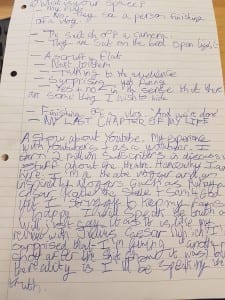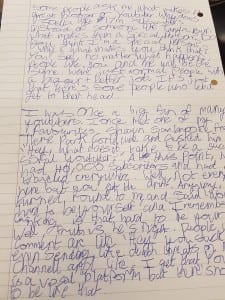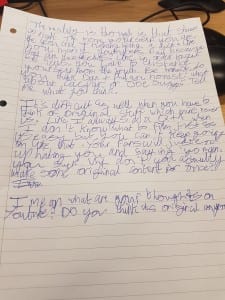Last semester, a university lecturer said to me that “The hardest thing…is a blank page.” as you never know where to start or where your first piece of inspiration will come from (Bolton, 2017). Personally, I feel that no matter what you write for the first time, it will not be amazing. If anything, it will be terrible. However, its better to have terrible stuff on a piece of paper than have nothing at all. As Hugh Laurie once said, “no one is ever ready to do anything. There is almost no such thing as ready. There is only now. And you may as well do it now. Generally speaking, now is as good a time as any.” (Laurie, 2012).
So why am I saying this? Well, in order to help create some ideas for my solo piece, we did an exercise in which we had to create a monologue for ourselves that could be on anything we wanted it to be and had to take into consideration the audience and their role, the space and what would happen, lighting and sound, changes and transitions in the work and also the essence of the piece. Now for some, this is a daunting prospect. To me, if you don’t like it then scrap it. You don’t have to stick with it if you really don’t want to do it. Here is the finished product.



So as you can see, it looks very messy and clunky but I started to think about things that rile me so I could have a rant about the way society is going with two rules – no mention of Trump or of the sex scandals that have happened in Hollywood. So as I was writing, I became obsessed over the idea of the internet culture and how social media has taken over our lives. However, my main inspiration that I wanted to look at was at YouTubing and I decided to take on the persona of a YouTuber struggling to get views on YouTube. Now the reason why I wanted to look at that is because in the past five years or so, YouTubing has become not only a successful industry but also a place recently which sparks negative connotations such as drama, ego and also the idea of how you can get a name easily as seen in the following video below from YouTuber, Logan Paul titled “So Sorry.”.
(Logan Paul Vlogs, 2018).
Now in observing this culture, I felt this could be interesting as I wanted to see how people view someone just by one video and I also feel by experimenting with the idea of that you only see one side to them and never their honest and genuine side.
So from doing that, I decided to tweak it and change it where now my idea evolves around how a YouTuber gets the reputation and how far they are willing to go to receive the reputation whether good or bad. Yet, I don’t know much else aside from that I want to be able to livestream the show so people not in theatre are able to see me tarnish the idea of my “supposed” reputation live on their phone but also so it can raise awareness that people must be careful now of what they say and do on the internet.
Works Cited:
Bolton, J. (2017) Introductions and Inspirations [workshop]. Off the Page DRA3047M-1718, University of Lincoln, 27 September.
Logan Paul Vlogs (2018) So Sorry. [vlog]. 2 January. Available from https://www.youtube.com/watch?v=QwZT7T-TXT0 [accessed 08 February 2018].
Timeout (2012) Hugh Laurie sings the blues. New York: Sophie Harris. Available from https://www.timeout.com/newyork/music/hugh-laurie-sings-the-blues [accessed 08 February 2018].
